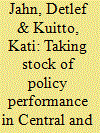| Srl | Item |
| 1 |
ID:
072260


|
|
|
|
|
| Publication |
2006.
|
| Summary/Abstract |
Most macro cross-national studies in political science that analyze the impact of globalization on domestic policies do not sufficiently consider the methodological consequences of diffusion processes, or "Galton's problem," as it is often referred to. I argue that globalization is a form of diffusion. Therefore it requires a shift from an exclusively functional analysis, which dominates in almost all established comparative studies in the field, to a diffusional analysis. I assume that globalization leads to a shift in focus on the part of political actors from domestic to international issues. I test this hypothesis by examining social expenditure rates of sixteen highly developed welfare states. The results indicate that globalization has become a highly influential factor since the late 1980s in contrast to the years before. In addition to the actual results presented here, the methodological approach of analyzing globalization as diffusion is relevant to other areas of comparative and international politics and may be a tool in future research.
|
|
|
|
|
|
|
|
|
|
|
|
|
|
|
|
| 2 |
ID:
106941


|
|
|
|
|
| Publication |
2011.
|
| Summary/Abstract |
Despite the ever growing body of scholarly work on policy developments in the post-communist New Member States of the European Union (NMS), systematic comparisons of policy outcome performance and its determinants are still scarce. This article identifies patterns of post-communist policy outcomes across the fields of economic, social and environmental policy. By employing pooled time-series cross-sectional analysis with a Fixed Effects Vector Decomposition (FEVD) estimator it investigates to what extent policy outcome performance is determined by differing policy efforts (outputs or reform tracks), transitional conditions and international influences. Although citizens are still negatively affected by the initial economic recession, especially in the social domain, policy reforms and efforts are decisive in determining the outcome performance of the NMS relative to one another in the longer run. Successful and comprehensive market reforms and steering capabilities prove to be particularly important in this regard. Furthermore, internationalisation has an important, albeit ambiguous, impact. While exposure to the world market is reflected in negative policy performance, interaction with and financial commitment from Western European Union countries promote positive policy outcomes.
|
|
|
|
|
|
|
|
|
|
|
|
|
|
|
|